Lovely, Dark, and Deep
“And into the forest I go, to lose my mind and find my soul” - John Muir
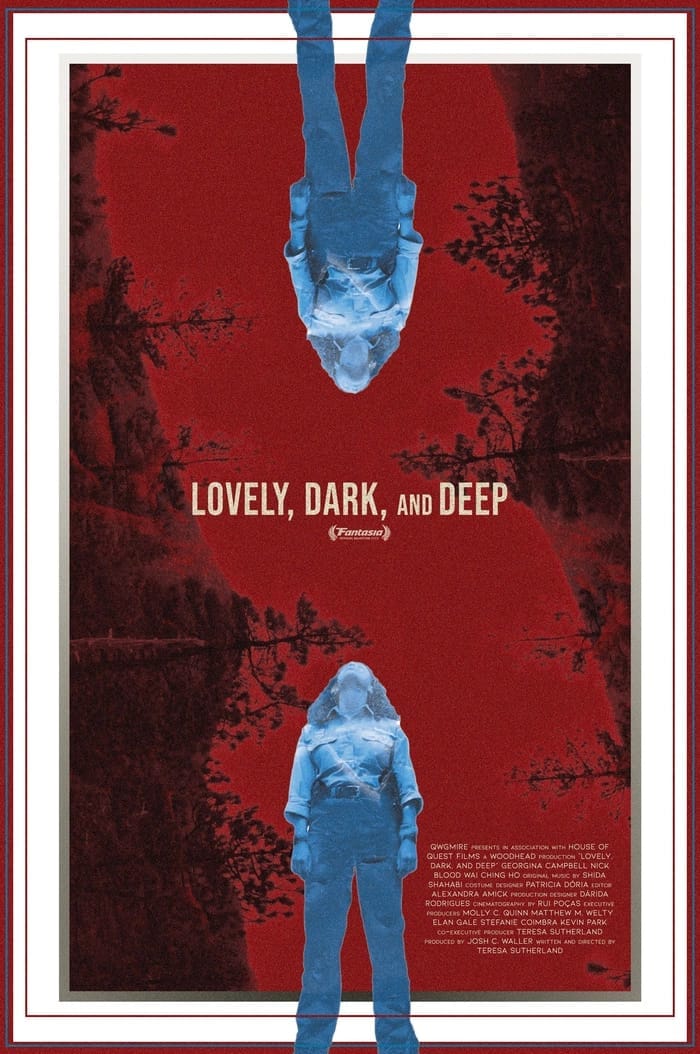
A new backcountry ranger, assigned to a remote Ranger Station for three months, must live alone in a dark and dangerous woods, all while working to uncover the truth about a tragedy that has haunted her since she was a child.
In the vast immensity of the wilderness, a place far away from the rest of society, a place where you’re mostly alone… except when you’re not… Ranger Lennon has finally gotten the job posting that she has long been chasing. She’s been assigned to man one of the remote Ranger Stations in the wild backcountry of Alvarez National Park. New Rangers heading out to the wilds for their lonely three month tenure are told: “Leave nothing but footprints. Take nothing but memories. Kill nothing but time.”
And with that, she’s off into the woods, where her only lifeline to the outside world is a walkie-talkie that only works so well.
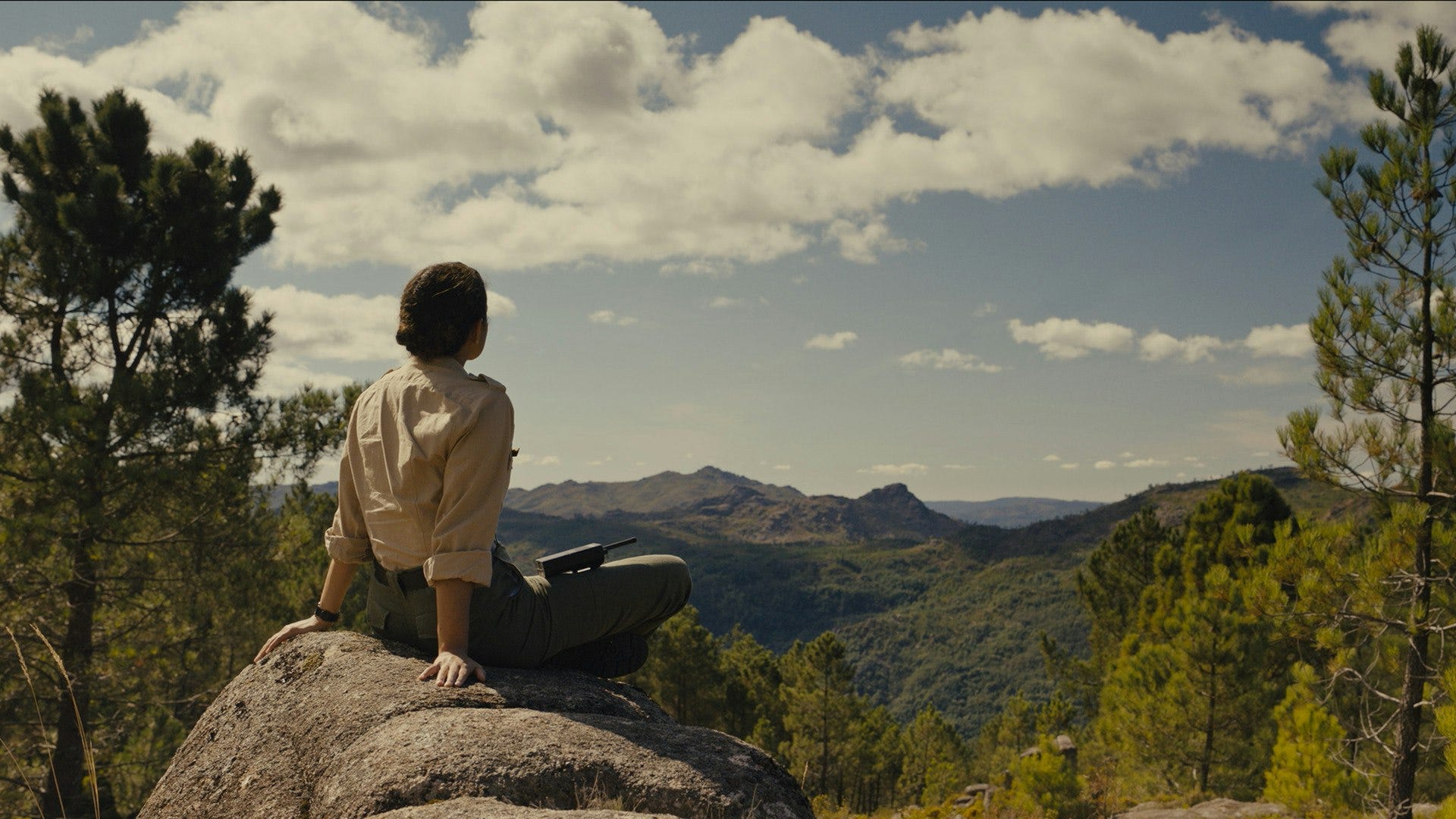
The film’s title comes from the Robert Frost poem Stopping by Woods on a Snowy Evening, with the famous line:
“The woods are lovely, dark and deep,
But I have promises to keep,
And miles to go before I sleep,
And miles to go before I sleep.”
Having watched the film, I can definitely see the connection to the story and its characters, but much like the quote by John Muir that opens the film, I think both of those connections are a bit of a stretch, most likely the result of too much high-level brainstorming discussions, and are mostly indicative of the immense gulf that can lie between the writer’s original intention, the director’s ability to understand that vision, and the end result that is projected up on the big screen.
This is Lovely, Dark, and Deep’s main issue.
This is a film of high concepts and lofty metaphorical goals that just don’t quite connect, which throws off everything else about it. The filmmakers meant well, they took their shot, but in the end, they fell a little bit short.
Sometimes that shit happens…
So, haunted by the appearance of black deers, an omen of unfinished business that is preventing you from moving forward in life, Lennon spends a lot of time listening to radio talk shows and podcasts that are focused on sudden disappearances in National Parks. She is also reading one of the Missing 411 books by David Paulides, a series of books that catalog the surprisingly long list of names, many of them children, and the strange details behind their inexplicable disappearances while visiting national parks and forests around the world, with many of those disappearances being of the “I just turned around for a second and they were gone” variety.
And much like when it comes to the number of people who have been raped or killed, or who just go missing, while on cruise ships, especially in international waters, there is no official database for how many people go missing in national parks, so the books also track and identify the geographical clusters in North American national parks where these kind of strange disappearances are much more heavily concentrated.
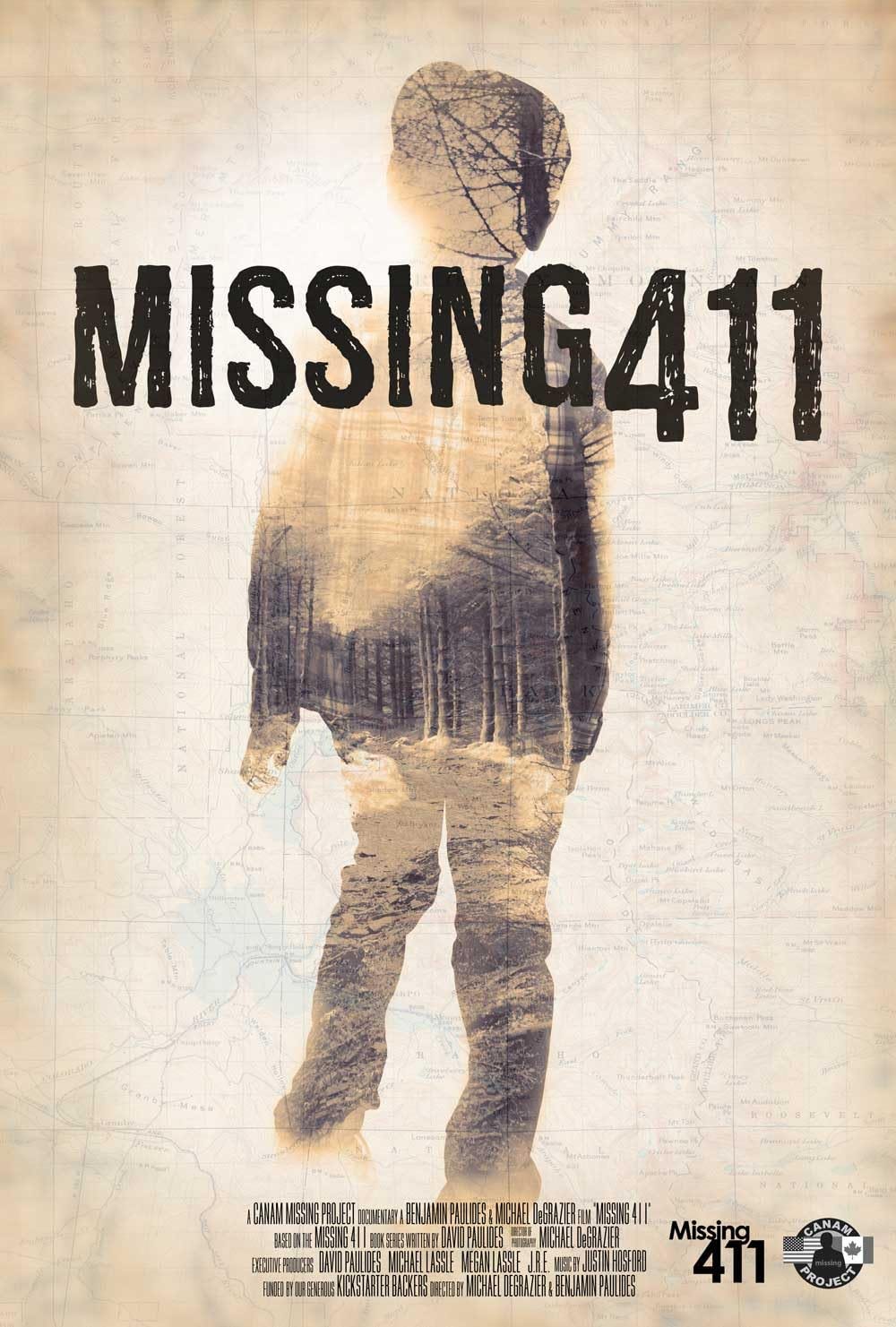
To be clear… it’s mostly a bunch of smooth-brained “unsolved mysteries” conspiracy nonsense built off real life tragedies, but whatta ya’ gonna do, that’s American culture in general, so anyway…
Also, there’s a couple of these Missing 411 “documentaries” on some of the streaming services, which highlight a few of the sadder and weirder cases, but fair warning, most of them eventually get around to laying the blame at Bigfoot’s big feet.
This is a shockingly common topic of overlapping interest amongst the various tinfoil hat conspiracy theorists sects out there, especially when their theories of choice focus on national parks and/or wilderness in general, so normally, when something like this suddenly takes a hard left turn into claiming that Bigfoot is responsible, it’s a lot like finding out an Evangelical Christian votes Trump because they’re concerned about “urban crime” and “the southern border.”
It’s more surprising to discover that there isn’t an overlap.
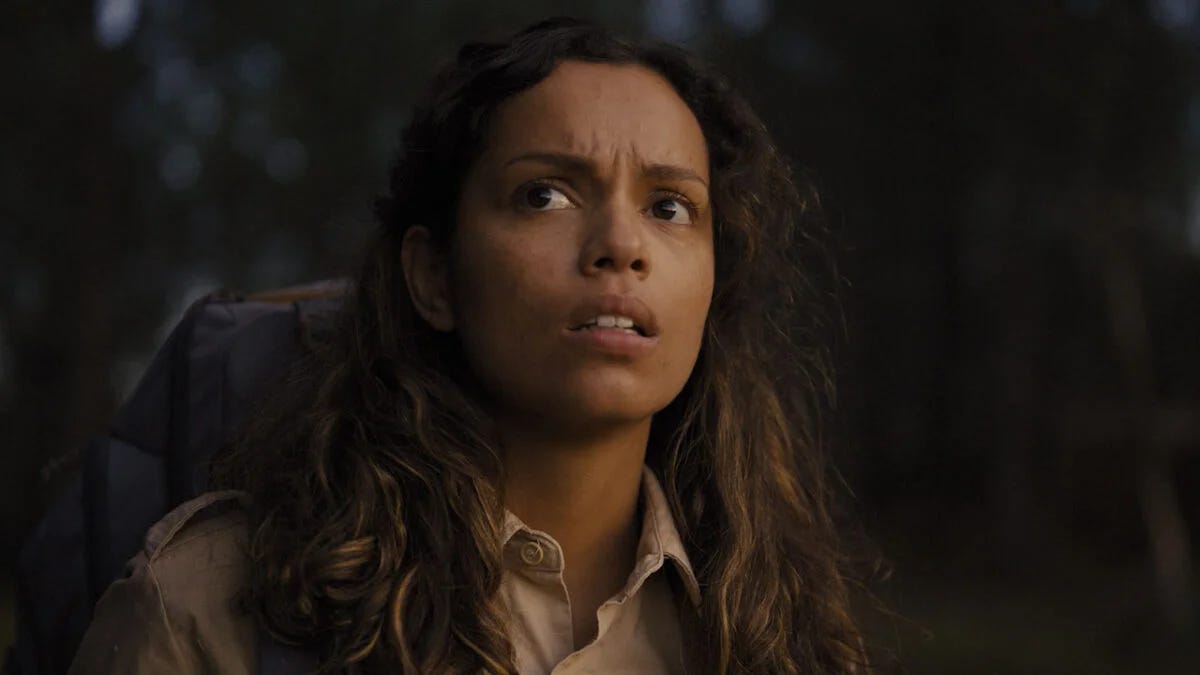
So, imagine my surprise upon watching Lovely, Dark, and Deep and discovering that there’s no Bigfoots to be seen.
Instead, it quickly becomes clear that Ranger Lennon wanted this specific ranger job because she’s looking for someone she loved who went missing a long time ago. That person disappeared near the Granite Boulder Fields, one of the largest granite fields in the world apparently, and it’s located in Alvarez National Park, which is, allegedly, also where one of the largest clusters of missing people in the entire world is.
The person that went missing is her little sister. She disappeared nearly twenty years ago, as they played together by their family’s camp site in Alvarez National Park.
Guess what area of Alvarez National Park Lennon is now posted to?
Soon enough, Ranger Lennon realizes that there is something in these woods, and that it takes people, and that the other rangers know about it. In fact, they have always known about it, and they’re helpless to stop it.
And now the forest wants her.
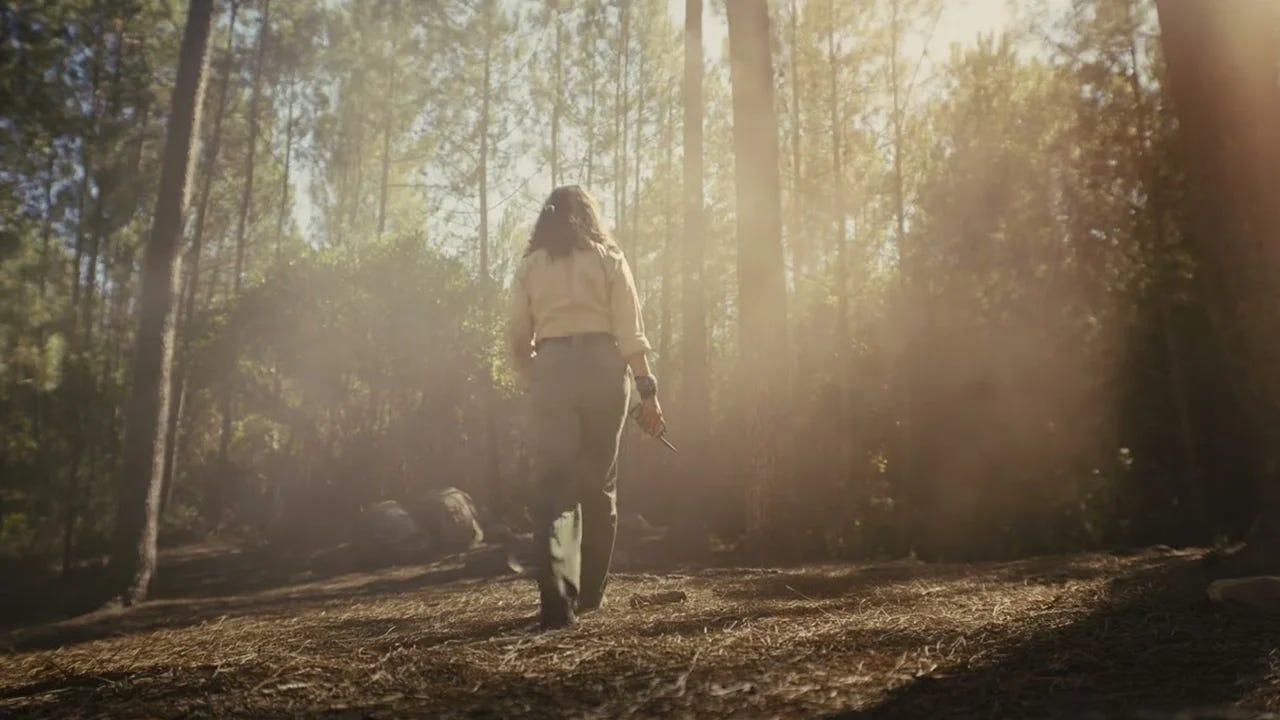
In the end, this film isn’t anywhere near as scary as I was hoping it would be. The horror, and the film itself, both kind of drag a bit, especially towards the end, and the explanation for what is happening, and why it is happening is pretty heavy-handed.
Still, there’s some good stuff here too. It looks good, the cast is great, and as an unexpected bonus, the night time scenes in the forest aren’t only tense, but they’re shockingly well-lit. Even though she is alone in the deep and scary darkness of the woods, with only a flashlight to light her way, you can still see what’s happening, and that’s impressive. I really appreciate being able to tell what’s going on in scenes like this, instead of having no idea, because the film is relying too heavily on shadows and a wildly swinging camera to build its tension.
So, while I guess I would say that Lovely, Dark, and Deep is worth watching, to be clear, it’s also a bit of a disappointing experience. This is a generally well-written little horror story, one that’s based off of a really great idea. It’s also really well executed for most of the film, but the third act is both too timid and also too ambitious. It’s clearly unsure of how exactly it should say what it clearly wants to say, so it just ends up stumbling about, and finally losing its way in a forest of ideas.
It’s fine. Not great. Not bad. A little disappointing. Fine.
